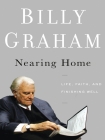Nearing Home, Billy Graham [funny books to read TXT] 📗

- Author: Billy Graham
Book online «Nearing Home, Billy Graham [funny books to read TXT] 📗». Author Billy Graham
Go to the ant, you sluggard;
consider its ways and be wise! . . .
It stores its provisions in summer
and gathers its food at harvest. (Proverbs 6:6, 8)
I have heard it said, and I wholeheartedly agree that as in all successful ventures, the foundation of a good retirement is planning. I would add to that the necessity of prayer. The Bible tells us to pray about everything, so pray that God will take possession of your life totally and completely. When we do this, we reveal our dependence upon Him.
Avoid the Traps of Unnecessary Expenditures
One of the most common financial snares affecting some people as they grow older is what we might call the debt trap. The temptation to run up huge credit card bills in order to pay for things we cannot afford (and probably don’t need) can happen at any stage of life, but it is especially disastrous for seniors who have no employment income to pay back the debt. Sadly, the debt trap causes some seniors to declare bankruptcy.
Don’t give gifts you can’t afford. This often happens when grandparents try to buy the affection of children or grandchildren by showering them with overly generous gifts. Harsh as it may sound, some parents use money almost as a weapon, attempting to control their children with it or using it to try to bridge the gap between them and an alienated child. They have forgotten the Bible’s wise words: “Above all, love each other deeply, because love covers over a multitude of sins” (1 Peter 4:8).
Guard against unwise financial decisions as you grow older. There are many trustworthy financial planners, but some target older people who may be duped by glowing promises and persuasive presentations. Don’t believe everything you hear, and don’t make major financial decisions without consulting knowledgeable people you trust. The old adage is right: if it sounds too good to be true, it probably is.
While caution is necessary when considering how to allocate your resources, don’t become obsessed about your finances. “All my aunt ever thinks about is her money and her fears that she’s going to be left destitute,” I heard one man say. “She won’t even let me change some burned-out light bulbs because she’s afraid she won’t be able to afford her electric bill. I know she has more than enough to see her through, but she refuses to believe it, and she’s become a prisoner to her fears.” Take control of your finances by setting up a sensible budget and sticking to it. This way you won’t be a slave to debt, a victim of predators, or a prisoner of fear.
Deal Frankly with Any Legal Issues
Having a valid will is critically important. Some people avoid doing it because they fear the expense; others feel they don’t have enough to make a will worthwhile; still others worry about conflicts a will may cause in their family.
Consider, though, the impact of leaving this world without a will. The implications to your family can be devastating. Laws differ from state to state, but in certain circumstances the fate of the possessions of someone who dies without a will is decided by the courts or by state law, not by the person’s family. The result is often much different from what the deceased would have wished. Apart from that, the lack of a will may cause bickering and conflicts between family members who think they are entitled to get certain things from the estate. “Our mother had some nice things,” one woman wrote me recently, “but after she died the arguing over who would get what became very bitter. I know she would’ve been shocked at the way some family members acted. Why are people so greedy? Most of it wasn’t worth much anyway.” In her letter she mentioned that her mother had died without a will.
Deciding to have a will prepared is only the first step, however; more important are questions about your wishes for the disposal of your property—in other words, who will benefit from your will? But other questions may also need to be addressed as you make your will, such as who the executor of the estate will be, and whether any part of the estate will be placed in trust instead of given outright to an heir. These can be complicated questions with far-reaching implications, and they are best handled with the help of an attorney who is skilled in estate matters.
No matter how simple or complex a person’s estate may be, however, any estate plan needs to be prepared thoughtfully, carefully—and prayerfully. God is just as concerned about what you are going to do with your possessions after your death as He is with what you are doing with them right now. Do you see them as yours alone, to be used selfishly and in any way you want, or do you realize they have been entrusted to you by God and are to be used for His glory? A man who has always made a point of tithing his income, of giving one-tenth of it to his church and other Christian organizations, told his family he plans to do the same with his estate, and he has written it into his will. Certainly these written instructions can help clarify the wishes of the deceased. King David prayed, “But who am I, and who are my people, that we should be able to give as generously as this? Everything comes from you, and we have given you only what comes from your hand” (1 Chronicles 29:14).
LIVING ILL AND LIVING





Comments (0)